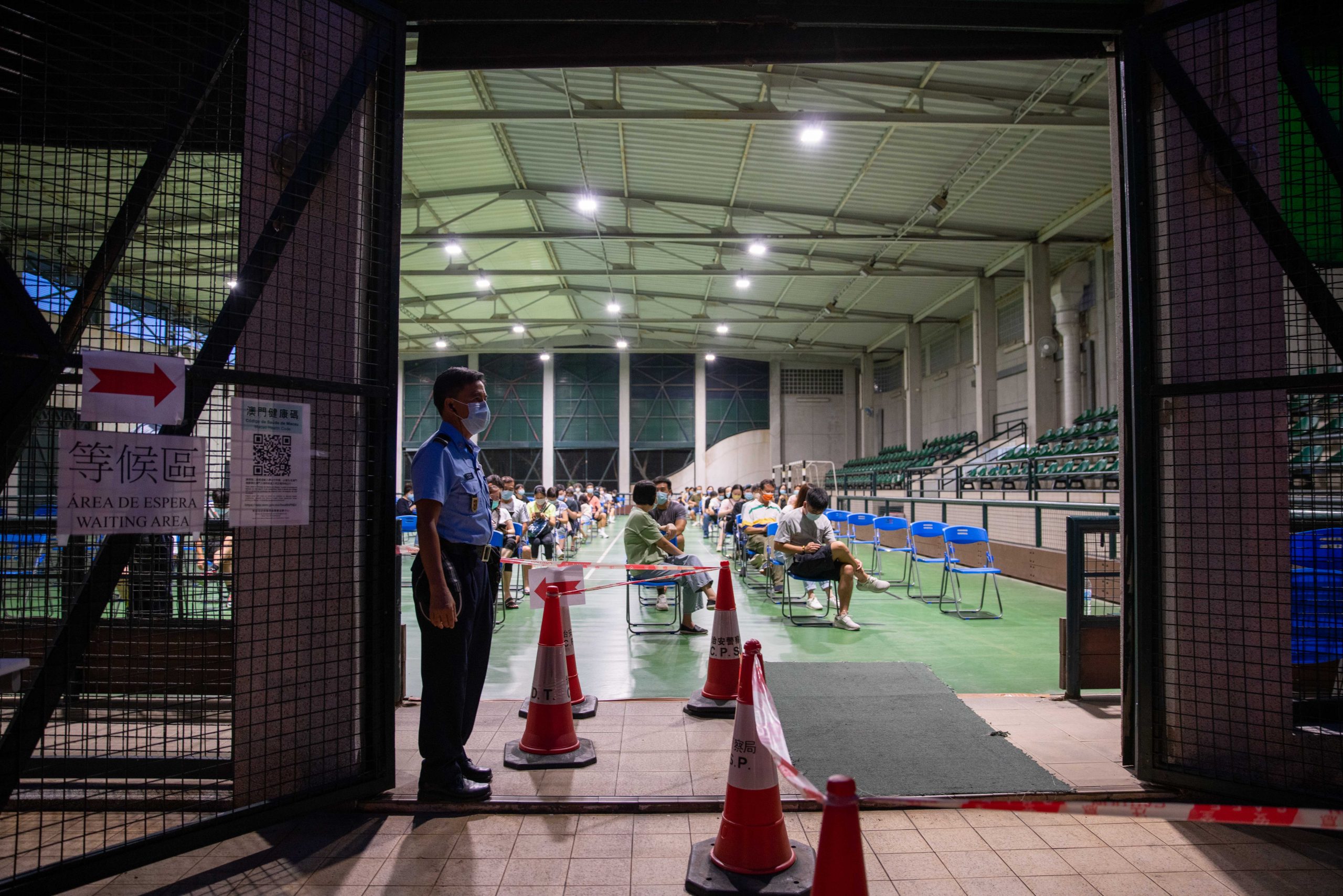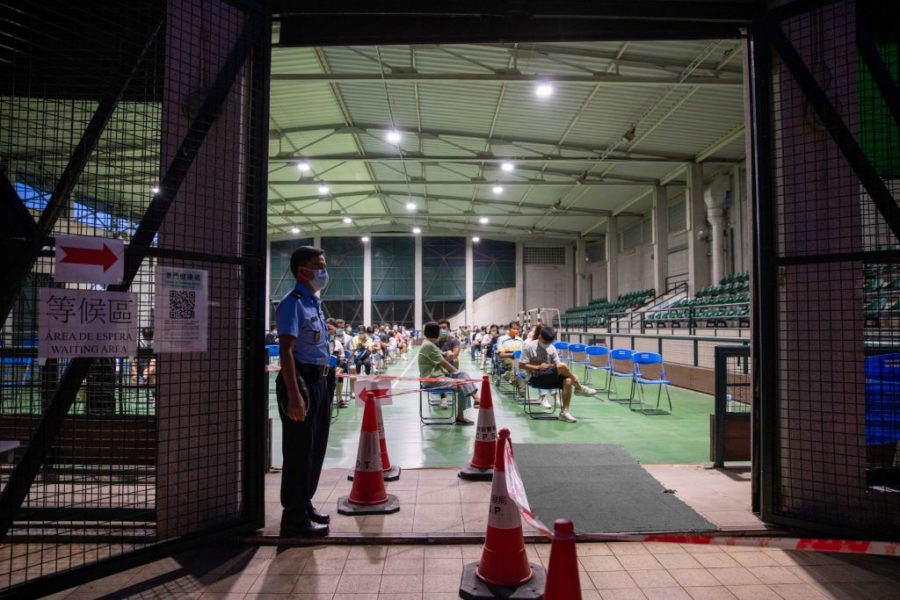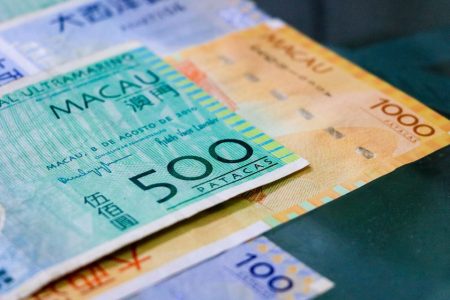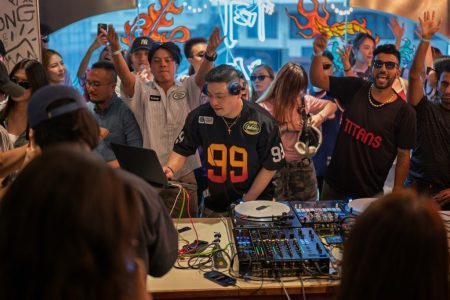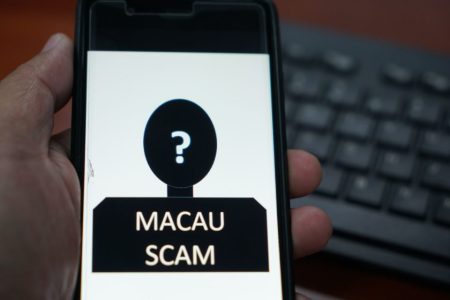It felt like it came out of nowhere. Late in the evening on 18 June, Macao authorities announced that 12 positive cases of Covid-19 had been detected during routine testing. Since then, Macao has become a sea of sirens as frontline healthcare workers scramble to keep up with the inflow of cases and track down Patient Zero.
As of 4 July, Macao has recorded more than 900 Covid-19 cases, of which about two-thirds have been asymptomatic. The wave infections also brought the city its first two fatalities related to Covid- two elderly women both over the age of 90.
Prior to this wave of infections, Macao had a total of 82 local Covid-19 cases in the 2.5 years since the pandemic began. The government’s decision to immediately shut the city’s borders to non-residents and quarantine foreign arrivals in 2020 protected the city from a local outbreak until now.
“Macao has become a sea of sirens as frontline healthcare workers scramble to keep up with the inflow of cases and track down Patient Zero”
The Omicron variant, which is less deadly but much more contagious than previous strains, has pervaded even the most reclusive measures. It led to the fatal fifth wave of infections in Hong Kong in February, bringing the financial centre’s healthcare system to its knees, and then wreaked havoc in Shanghai amid stay-at-home orders that lasted over two months.
As Macao officials work to avoid a citywide lockdown, we wonder: How did this happen? And where do we go from here?
Tracking Patient Zero
Officials say they have not yet found the origin of the latest community transmission. However, they believe that all cases can be traced back to a single Patient Zero, rather than multiple people.
As of 4 July, 16 clusters have been identified, including a shared dormitory in Edificio Yim Lai, a laundromat in Areia Preta, and a locker room at the Four Seasons Hotel Macao.
Health Bureau Director Alvis Lo revealed that the Omicron variant (specifically, the BA.5.1 sublineage) accounts for all cases so far. BA.5.1 is the latest variant causing surges in infections all over the world, including Singapore, Portugal and the US. What’s more, studies show BA.5.1 is able to evade vaccination, as well as prior Omicron infections.
Lo said the bureau is still investigating how the virus breached the city’s strict preventive measures. For example, the virus could have been introduced to Macao by an overseas arrival, imported items or frozen goods.
Although the bureau has not ruled it out, Lo says his team doubts the outbreak can be linked to mainland China because BA.5.1 has not spread widely there.
During a press conference on 23 June, the Health Bureau chief admitted that it’s possible that officials will never be able to find the original source of the variant in Macao or how it led to a widespread outbreak.
Crowd control
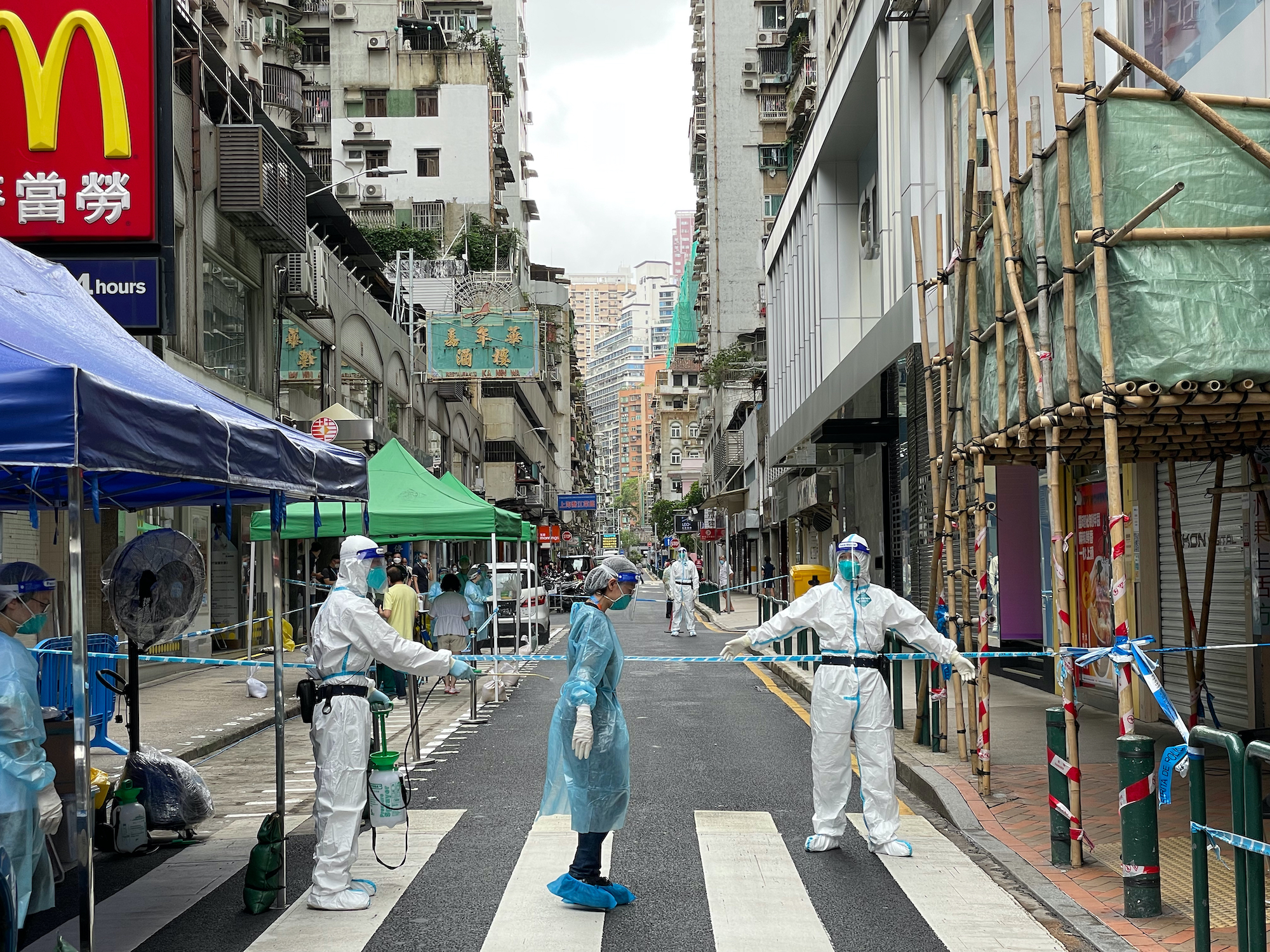
Immediately after the discovery of the first dozen cases, Chief Executive Ho Iat Seng imposed a State of Immediate Prevention on 19 June, urging residents to stay home and pay attention to official announcements.
For the next two days, the government conducted citywide Nucleic Acid Testing (NAT) in an effort to identify more cases. At the time of writing, the city has held three mass nucleic acid testing (NAT) drives along with at least half a dozen self-testing orders since the start of the outbreak.
Authorities have also cordoned off several buildings where households with multiple confirmed cases live while restricting the movements of residents during a five-day “sealed control period” of testing and monitoring.
To avoid a citywide lockdown and minimise the impact on the general population, the government split virus hotspots into two categories of risk level.
Those in a “Red Zone” can’t leave the premises and must rely on health personnel to deliver fresh produce and goods. Those in a “Yellow Zone” must self-monitor for symptoms for a week and conduct a series of Covid-19 tests.
In addition, the government has been sending close contacts of confirmed cases to hotels for quarantine.
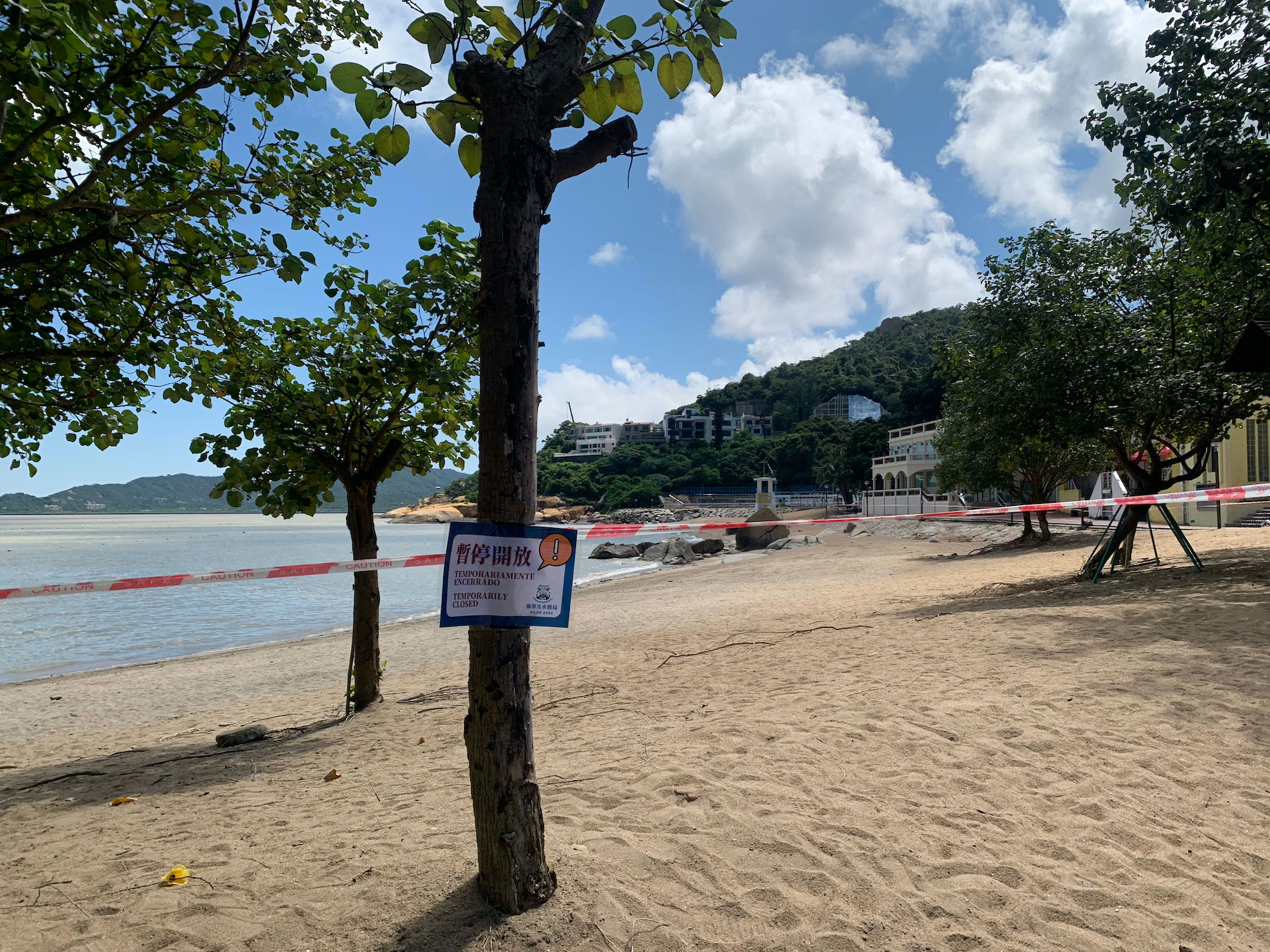
Authorities have also cancelled school classes and public events, and paused all in-person government and banking services. Places where crowds often gather, such as beaches and parks have also been taped off. Bus operators reduced services by 20 per cent. The government also ordered non-essential businesses – such as gyms, hair salons and cinemas – to shut until further notice, while restaurants can operate takeaway services only.
“I’m on [unpaid] leave for the next two weeks and I still have to pay my rent and living expenses. I really need to watch my spending in order to survive. Everyone’s livelihoods are being affected,” Ron, a kitchen worker, tells Macao News.
A notable exception to the closures were casinos. Chief Executive Ho Iat Seng said casinos will continue to operate as authorities study the situation to ensure the job security of local residents during this period of economic uncertainty. But, as of 1 July, Macao’s gaming regulating body reportedly ordered operators to send 90 per cent of their staff on leave for the next week. Casinos have been open since February 2020, when the government ordered their closure for two weeks at the beginning of the pandemic.
As a precaution, the government required anyone entering gaming floors to present a negative NAT result (valid for 48 hours). In addition, casino staff also had to present a daily rapid antigen test (RAT).
However, the requirement caused crowds to form at testing centres, forcing authorities to scrap NATs and require only a daily RAT for workers.
The outbreak has also caused turbulence for those who live in Zhuhai but work in Macao. The neighbouring city mandated a seven-day quarantine for Macao arrivals upon the discovery of the cases, which has jeopardised daily border crossings.
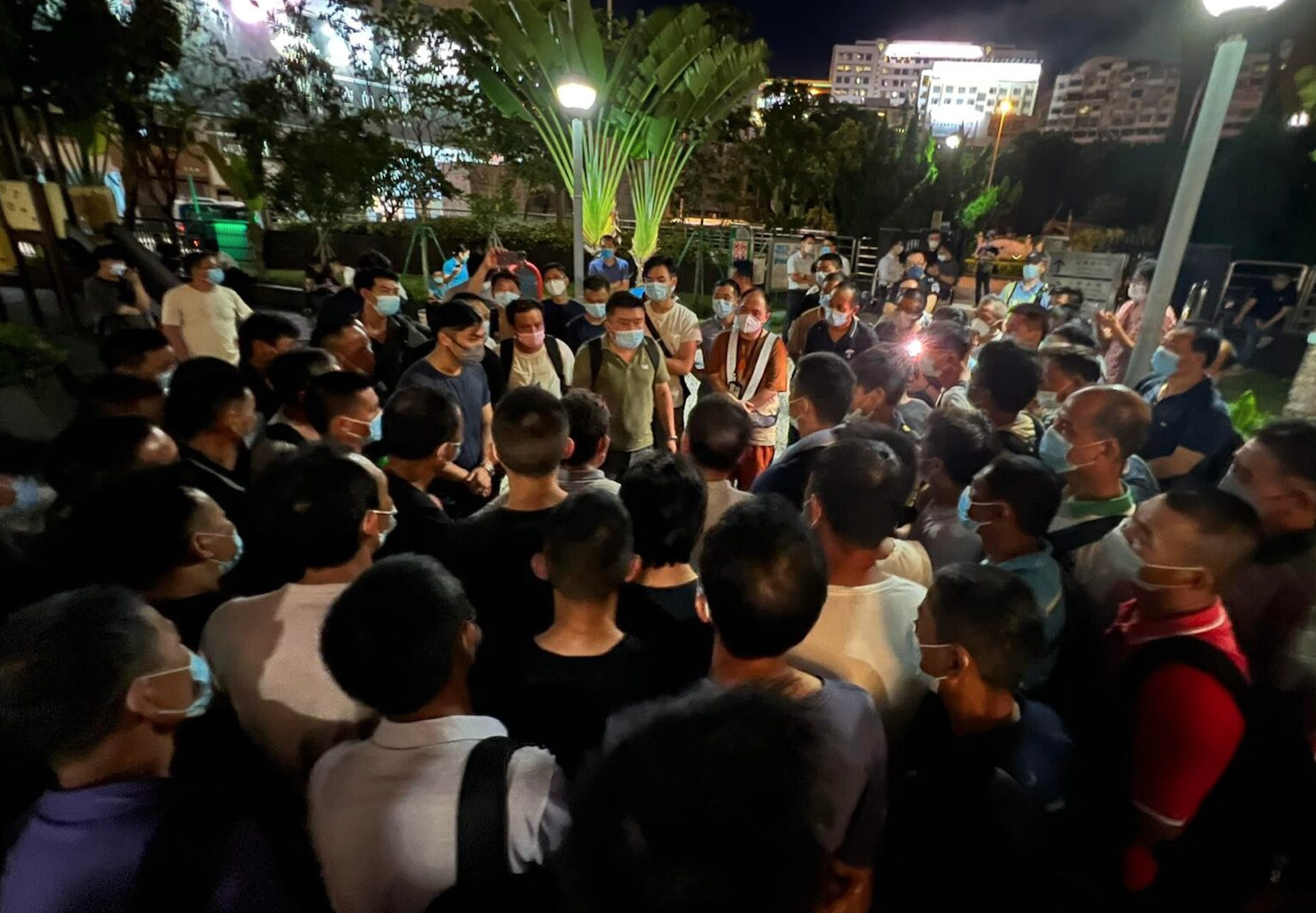
On 22 June, more than 200 construction workers marched to the Liaison Office from construction sites in Coloane, demanding employers foot the bill for the week-long quarantine requirement in Zhuhai, which they say costs more than a month’s salary.
Tip of the iceberg
Multiple universal testing exercises have confirmed the continuing spread of Covid-19 in the community. In less than two weeks, the number of cases have ballooned from 12 on 18 June to more than 900 as of 4 July. More than 12,000 people are currently under some form of medical observation or isolation measures.
“Over 600 cases have been found so far, ⅔ of which are asymptomatic while more than 10,000 people are under some form of medical observation”
During a press conference on 27 June, Lo said that the city is making progress in its efforts to quash the chain of transmission, but every day, the bureau finds more cases that need to be traced.
So far, the majority of cases have been found during mass testing exercises rather than among those in hotel quarantines or Red Zones. Meaning, the highly infectious virus is still spreading among the public and several more infection links remain. Authorities will need to detect and control these links in order to reach the city’s zero-Covid goals.
While authorities have acknowledged that the situation is more complex and serious than anticipated, they were prepared for this scenario. The Macao authorities developed a detailed contingency plan earlier this year to prepare for a potential outbreak. Published in April, the comprehensive document outlined plans to purchase RAT kits in bulk, construct a makeshift hospital at the East Asian Games Dome and deploy targeted lockdowns of affected areas rather than a city-wide shutdown.
Thanks to this blueprint, the government had a strategy in place at the onset of the outbreak and has been able to adapt as the situation develops. For example, the criteria for Red and Yellow zones, as well as isolation measures for close contacts, have changed several times over the past week based on available resources and emerging insights.
What comes next
Some experts and residents question if striving for zero-Covid cases is the best strategy going forward. Other countries and regions that previously adopted the same strategy, such as Singapore, Taiwan and Australia, have relaxed or removed quarantine-on-arrival requirements and are now “living with the virus”.
“There’s no more hope, people are leaving by choice and it is looking very, very grim,”
– Alidad Tash, managing director of 2NT8
Critics of the policy lament Macao’s struggling economy. Daily arrivals hover at less than 1,000 these days. Just two months ago, the city saw more than 40,000 daily arrivals for Labour Day weekend. Meanwhile, analysts predict gaming revenue will plummet to essentially zero in the next few weeks.
“2022 is the first year that the impact on the economy is really hurting the small businesses. For the first couple of years [of the pandemic], they lived on savings. Now there’s no more savings. There’s no more hope, people are leaving by choice and it is looking very, very grim,” says Alidad Tash, managing director of gaming consultancy group 2NT8, “Just look around Taipa and see all the businesses that are closing.”
Restaurant owner Pedro Esteves says he’s been losing money on his business for the past two years and the uncertainty of Covid-19 restrictions makes things worse. “Every month, I never know what new problem is going to come. I’ve run my own business for over 16 years but I’ve never struggled so hard.”
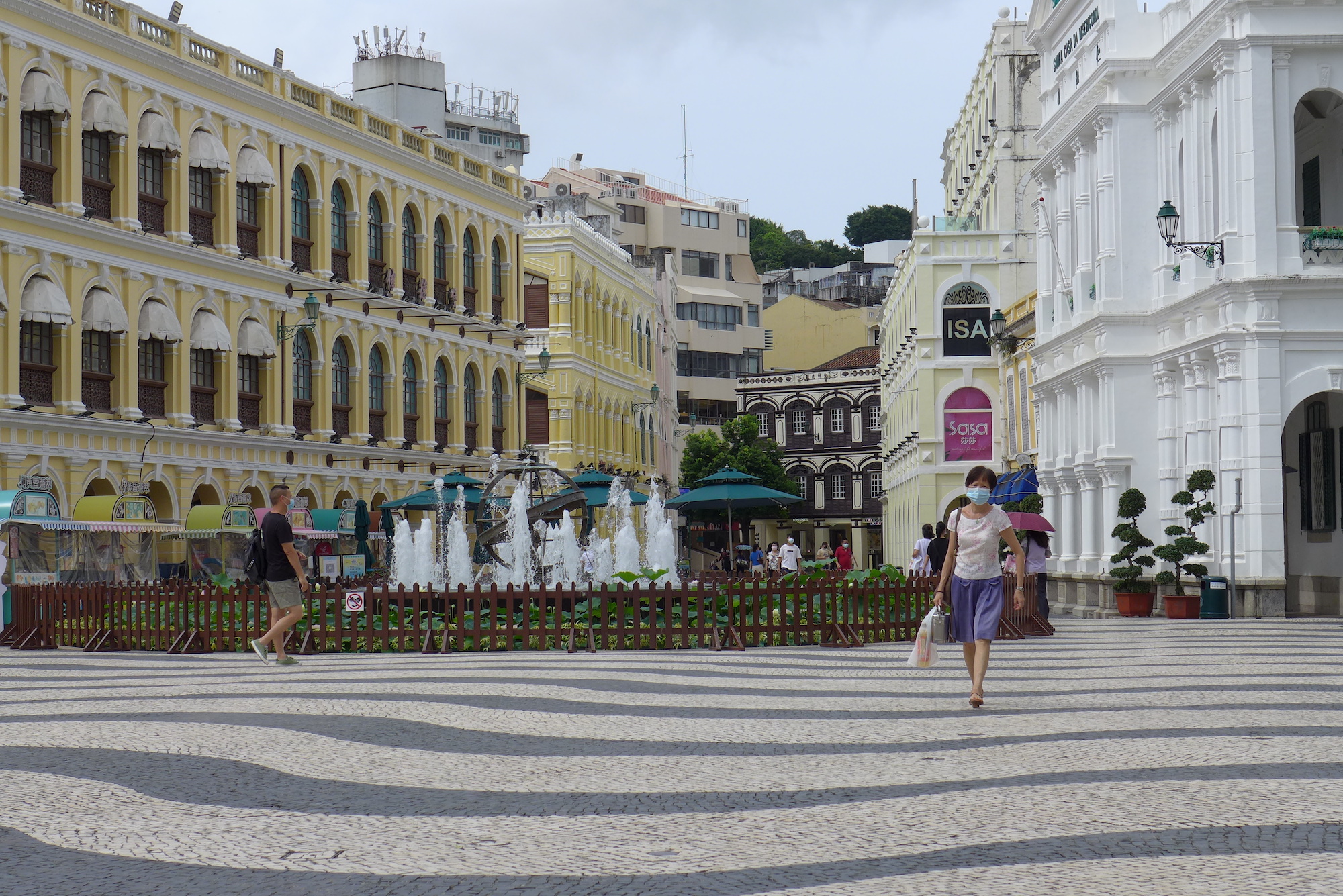
However, Macao officials say the city simply does not have the capacity to handle a mass outbreak because it only has one public hospital. There are fewer than 2,000 hospital beds in the city, of which only 266 are isolated and suitable for Covid-19 patients in severe condition.
“I’ve run my own business for over 16 years but I’ve never struggled so hard.”
– Pedro Esteves, restaurant owner
The government could boost capacity with a few thousand beds in makeshift facilities in Cotai, but authorities fear space would quickly fill up and overwhelm the healthcare system.
Even if city officials were willing to take the risk, Macao’s economy still relies on a travel bubble with mainland China. Angus Chu, head of the University of Macau’s Department of Economics, says Macao must walk in lockstep with Beijing, due to the city’s dependence on visitors from mainland China. “We need a zero-Covid environment to protect Macao residents and to keep the border with the mainland open. Otherwise, the absence of mainland tourists would hurt the local economy severely,” he says.
Travellers from mainland China made up 70 per cent of the city’s total arrivals in 2019. By the end of 2021, they accounted for 94 per cent of arrivals.
If Macao cannot diverge from zero-Covid, Chu believes that business owners such as Esteves need more support. “I would say that the government could afford to be slightly less conservative and provide an even more generous stimulus package to the society,” said Chu.
Signs of change
Although Beijing has consistently reaffirmed that it will maintain its zero-Covid efforts, it has started loosening some restrictions. Earlier this week, authorities in mainland China announced plans to halve hotel quarantine requirements for foreign arrivals from 14 to seven days, which would be more relaxed than Macao’s 10-day requirement.
Meanwhile, Hong Kong’s new Secretary of Health has hinted that the new administration could reduce the city’s week-long quarantine to five days. In a press conference on 29 June, Alvis Lo said he is studying the situation in Hong Kong and Taiwan (which has a three-day quarantine plus four days of self-health monitoring) and may consider a similar approach in Macao.
Jin Dong-Yan, professor at the University of Hong Kong’s School of Biomedicine, said that higher vaccination rates will be key if Macao eases Covid-19 restrictions. According to the virologist, during Hong Kong’s fifth wave, Omicron had a fatality rate of 0.03 to 0.04 per cent among those who were triple jabbed. Jin pointed out that this is even lower than influenza’s 0.1 per cent fatality rate.
“The rest of the world has already changed their view, so why should we stick to the original view? Keeping people in quarantine for [this] long is counterproductive. It’s a waste of resources.”
– Jin Dong-Yan, professor, Hong Kong University School of Biomedicine
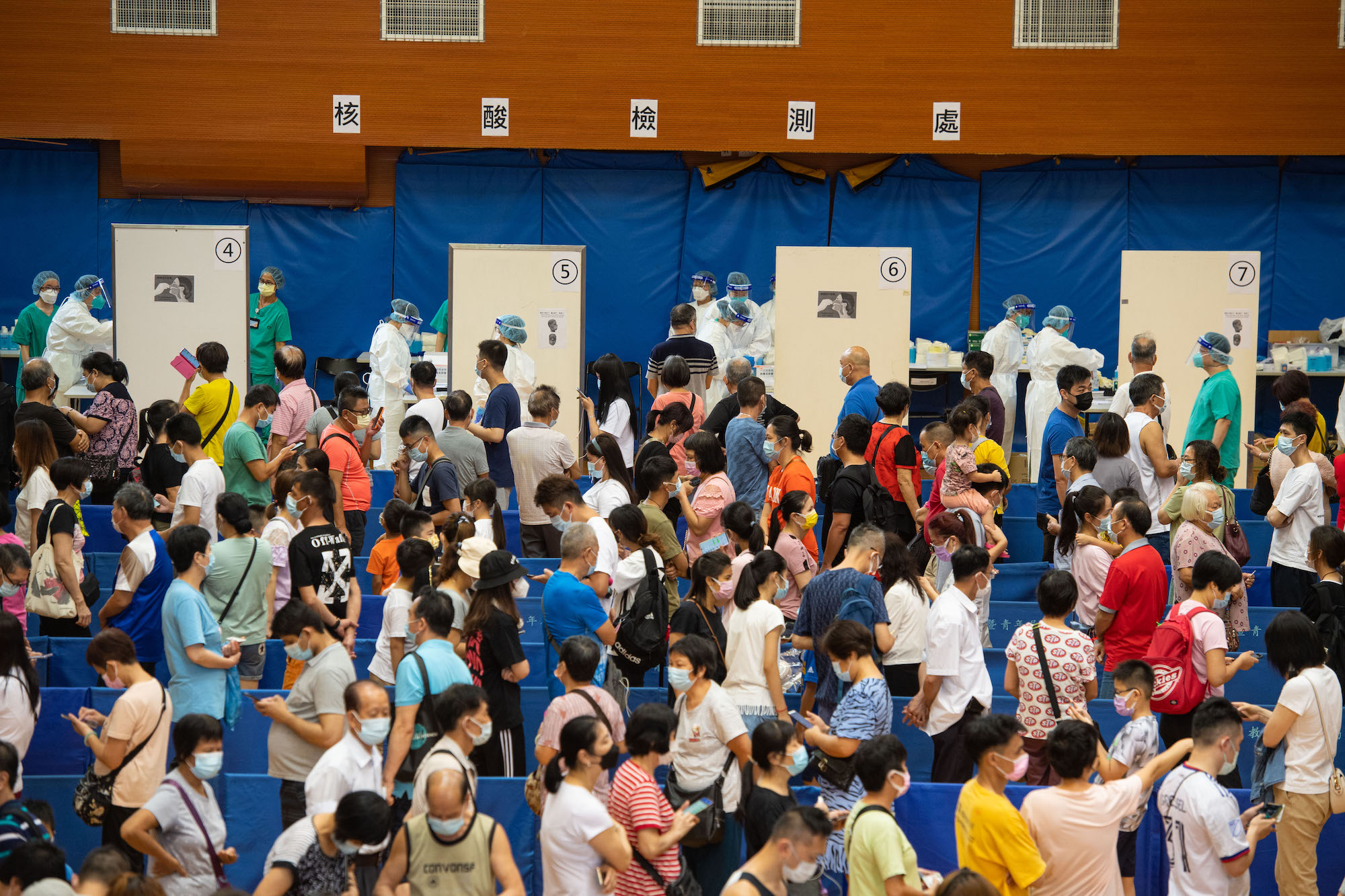
Vaccines have been available in Macao since February 2021. More than 90 per cent of the population have had at least one dose of a Covid-19 vaccine, although uptake is not as high for vulnerable demographics, such as older residents.
Roughly 89 per cent of people have received at least two doses, but official data does not outline how many individuals have been triple jabbed. If the city can triple-vaccinate at least 90 per cent of the population, it will lower the risk of severe illness during outbreaks, says Jin. Meaning, though infection rates could be high, critical illness and death rate would remain very low.
Furthermore, Jin says Omicron infections among the vaccinated tend to yield very low viral loads and a shorter transmissibility period of up to three days. “Omicron is very different from the original strain that was found in Wuhan,” says Jin. “The rest of the world has already changed their view, so why should we stick to the original view? Keeping people in quarantine for [this] long is counterproductive. It’s a waste of resources.”
This article was last updated on 4 July to reflect the latest case numbers and Covid-related fatalities.
